If This Goes On Read online
Page 2
“Know how much I paid for the vanilla beans?”
She told him. He whistled. “You’re right. No substitutes. Not for this. But—”
Clarissa said, “What about Switzerland?”
“There’s nothing of Switzerland left.”
“There are tons of mountains,” Clarissa said. “I used to ski them as a girl. Didn’t your family ski?”
“We preferred Aspen.”
“Then how do you know there’s not a cow hiding somewhere?”
“They used dirty bombs in the Four Banks’ War. Anything that survived will be radioactive.”
“I didn’t know about the dirty bombs.”
“It was kept out of the news. A bad look.”
“Then how—”
“Risk analysts in cryptofinance hear all kinds of unreported things.”
The curl of his hair seemed especially indulgent, his smile soft and knowledgeable. She worried the glass bead on its chain.
“I’ll ask around,” Clarissa said. “Someone must know. I’ve heard rumors of skyr, of butter—even cheese—”
“Doesn’t mean there’s a pristine cow out there. Be careful. People die for a nibble of cheese. I’ll never forgive you if you poison my mother.”
“You wait,” Clarissa said. “We’ll find a cow.”
Because the ice cream would be a coup d’état, in one fell swoop staking her social territory, plastering her brand across gossip sites, and launching the battleship of her marriage, Clarissa was reluctant to ask widely for help. It was her life’s work, just as it had been her Mim’s, to make the effortful appear effortless. Sweating and scrambling across Venezuelan mesas in search of cows would rather spoil the desired effect.
So she approached Lindsey, a college roommate, now her maid of honor, who was more family than friend, anyhow. Lindsey squinted her eyes and said she recalled a rumor of feral milkmaids in Unincorporated Oregon.
Rumor or not, it was worth following. Clarissa found the alumni email of a journalist, was passed on to a second, then a third. Finally she established that indeed, if one ventured east of the smallpox zone that stretched from Portland to Eugene, one might, with extraordinary luck, discover a reclusive family in Deschutes that owned cows three generations clean. But no one had seen any of them in months.
“You’re, what do you call it, a stringer, right? For the Portland Post-Intelligencer? Independent contractor, 1099? Well, what do you say to doing a small job for me? I’ll pay all expenses—hotels, private drone—plus a per diem, and you’ll get a story out of it. I just need fifteen gallons, that’s all.”
Icebox trains still clanked across the country over miles of decaying railbeds, hauled by tractors across gaps where rails were bent or sleepers rotted though, before being threaded onto the next good section. Their cars carried organ donations, blood, plasma, cadavers for burial or dissection, and a choice selection of coastal foods: flash-frozen Atlantic salmon fished from the Pacific, of the best grade, with the usual number of eyes; oysters from a secret Oregon bed that produced no more than three dozen a year; New York pizza, prepared with street mozzarella, for the daredevil rich in San Francisco; and Boston clam chowder without milk, cream, or clams. Her enterprising journalist added fifteen gallons of Deschutes milk in jerrycans to the latest shipment. Clarissa gnawed one thumbnail to the quick while she waited for the jerrycans to arrive.
Arrive they did, along with unconscionable quantities of sugar.
All that was left was the churning. Here Lindsey and three other bridesmaids proved the value of their friendship beyond any doubt, producing batch after creamy batch of happiness. Two days before the wedding, they had sculpted a moon of vanilla ice cream, complete with craters and silver robot-shaped scoop.
Ninety people, almost everyone who mattered, attended the wedding. The priest, one of six available for the chapel, still healthy and possessed of his hair and teeth, beamed out of the small projector.
“I promise to be your loving wife and moon maiden,” Clarissa said.
“I promise to be the best husband you could wish for, and the best father anyone could hope, for the three or four or however many children we have.”
“Three?” Clarissa said faintly. “Four?” But like a runaway train, her vows rattled forward. “I promise—”
Afterwards they mingled and ate. Then the moon was brought out to exclamations, camera flashes, and applause. The ice cream scoop excavated the craters far faster than the real robotic sifter could have.
Clarissa, triumphant, whirled from table to table on Richard’s arm.
“Know what’s etched on the robot?” she said. “Clarissa O. Bell and Richard H. Laverton III forever.”
“So virtual,” Monica said. “I’d kill for a man like that.”
“For what that cost,” Richard said, “we could have treated all of New York for Hep C, or bought enough epinephrine to supply the whole state. But some things are simply beyond price. The look in Clarissa’s eyes—”
Glass shattered behind them. A dark-faced woman wearing the black, monogrammed uniform of the caterers Clarissa’s Mim had hired swept up the shards with her bare hands.
“Sorry,” the woman said, “I’ll clean it up. Please, ignore me, enjoy yourselves—”
“Are you crying?” Clarissa said, astounded. “At my wedding?”
“No, no,” the woman said. “These are tears of happiness. For you.”
“You must tell me,” Clarissa said, the lights of the room soft on her skin, glowing in the green glass around her neck. The bulbs were incandescent, selected by hand for the way they lit the folds of her lace and silk.
“It’s nothing. Really, nothing. A death in the family. That’s all.”
“That’s terrible. Here, leave that glass alone. This’ll make you feel much better.”
She scooped a generous ball of ice cream into a crystal bowl, added a teaspoon, and handed the whole thing over.
“Thank you so much,” the woman said. This time, Clarissa was sure, her tears were purely of joy.
Another server came over with dustpan and brush and swept the glass shards up in silence.
Clarissa began to serve herself a second bowl of ice cream as well, so the woman would not feel alone, but Richard took the scoop from her hand and finished it for her.
His cornflower eyes crinkling, he said, “You made everyone feel wonderful. Even my mother. Even Mel. Even that poor woman. You’re a walking counterargument for empathy decay.”
“What’s—”
“Some researchers think you can’t be both rich and kind. Marxist, anarchist nonsense. They should meet you.”
The ice cream was sweet, so very sweet, and cold. Clarissa shivered for a moment, closing her eyes. For a moment her future flashed perfectly clear upon her, link by silver link: how a new glass drop would be added to her chain for each child, Chelsea and Charles and Nick; how Richard would change, growing strange and mysterious to her, though no less lovable, never, no less beloved; how she would set aside her childish dreams of saving the world, and devote herself to keeping a light burning for her family, while all around them the world went dark.
She opened her eyes.
It was time to dance. Richard offered his arm.
Off they went, waltzing across the moon, their shoes kicking up lunar dust with each step. The dance had been choreographed ages before they were born, taught to them with their letters, fed to them along with their juice and ice cream, and as they danced, as everyone at their wedding danced, and the weeping server was escorted out, and the acrid, acid sea crept higher and higher, there wasn’t the slightest deviation from what had been planned.
About the Author
E. Lily Yu received the Artist Trust LaSalle Storyteller Award in 2017 and the John W. Campbell Award for Best New Writer in 2012. Her stories have appeared in venues fro
m McSweeney’s to Uncanny and in seven best-of-the-year anthologies, and have been finalists for the Hugo, Nebula, and World Fantasy Awards.
Editor’s Note
I asked Lily for a story because I knew she’d give me something lovely and amazing and powerful, and she lived up to that expectation. Her story is a limpid, beautiful story of two people in love, just wanting a wonderful wedding to showcase their romance on its surface, but the cracks shine, showing the economic realities necessary to create their existence.
The world here is really two: the shining bubble in which Clarissa, her fiancée, and their companions live and the reality of the other 99%. The workers necessary to Clarissa’s dream world sleep in stairways and worry about their next meal. It’s a story about the obliviousness and lack of empathy on the part of the rich, one of the trends that’s moved America away from its democratic roots and towards a kleptocracy.
Recent figures show that we could end extreme poverty across the globe right now, if the world’s billionaires were to spend their money on that instead of the equivalent of Clarissa’s ice cream.
Twelve Histories Scrawled in the Sky
Aimee Ogden
When Keety’s alarm woke her up, a new history had been posted.
Outside her apartment window, the billboards gleamed with revised names and dates. Matching notifications flashed on the personal screens built into Keety’s countertop and living room wall, too. She rolled out of bed, shuffled to the counter, and committed the new details to memory while she downed her breakfast. The Security and Intelligence Bureau had been responsible for starting the war in 2155 with an unauthorized excursion into demilitarized territory. Yes, of course. By the time she had cleaned up the breakfast dishes, Keety knew the facts as well as she knew the date of her own birth. Better, even. There were no consequences for people who forgot their birthdays.
While she waited for the bus, another flash of red tugged her eyes upward. A new history already? SecInt was blameless now—had always been blameless. Keety dug her nails into her palm to drive that reminder home—and the war hadn’t begun till 2157, when military agents had moved to assassinate a pair of foreign heads of state. Of course. Of course. Keety overwrote the previous version with the fresh, true one, and wondered what it meant that revisions had come in so close together. Then she carefully turned her wonder to safer subjects: what time the bus would come, what the office cafeteria would serve for lunch.
Three more histories flip-flopped their way across the fifty-foot billboards over Main Street and Central Avenue by the time Keety arrived at work beaded in sweat. No one met her eye as she rushed to her desk and scanned in to her account. Rows and columns of data blinked to life in front of her, green and yellow and red metrics flashing for her attention. She flicked through a few sheets before digging in, but her gaze kept going to the monitors at the four corners of the office floor. Failing to complete work in a timely fashion wasn’t well looked on. But better that than failing to comply with history.
A new rendition of the truth at nine-thirty. The man at the desk kitty-corner from Keety put his head down on his arms and began to cry. The floor supervisor, flanked by his two guards, came and escorted him out of the building. When they had gone, the supervisor’s assistant came along with the trash bin to clear out the man’s belongings.
One more update at eleven, and this one lasted almost until dismissal time. Keety had begun to feel safer, back on familiar ground. When the latest revision flashed on-screen, a tiny groan escaped her. She pressed her lips together, but the floor supervisor frowned at her. If he was still watching as she shoved her things into her purse and rushed out to the bus, she couldn’t tell. She kept her head down as she whispered the new facts to herself. She marshaled them into neat rows in her mind, sorted and organized them till she had mastery.
On the bus, Keety glanced around but didn’t see any Factual Fidelity Officers. She closed her eyes and pretended to sleep, just in case one boarded at a stop before she could get off. She looked up only when her station was announced. When she disembarked, there was a new revision, and she choked this one down too.
She made dinner. She sat in her chair by the window while the reheated food cooled in its tray. Three more versions of history chased themselves across the screens outside and down Keety’s notification list before she gave up and went to bed.
When she woke up the next morning to her alarm’s insistent chirp, all the screens in the apartment were blank.
Not just in the apartment, either. Outside, hundreds—thousands?—of people milled in the streets in the long shadows cast by blank billboards. No riots. No one was shouting, though Keety could hear someone quietly weeping below her window. The Bureaus had always said that the people would go mad without someone to help them understand the nature of the world. Keety pressed her hands to her eyes. Maybe the madness would just take time.
Keety got dressed, paced her apartment for a few minutes, made herself breakfast but did not eat it. The dead gray rectangles built into her life smothered her with their presence and weight. She hefted a can of soda, thinking that maybe she could smash the glass—no. What would that solve?
There was a black marker lying atop the table. She picked it up, and climbed onto the chair by the window. Her knees trembled, but on the wall screen she wrote: There was a data analyst named Keety Lars, born on the 12th of June, and here are the things she knows for certain are true . . .
When she finished, she capped the marker and slipped it into her pocket. The list was short, so very short. That was all right, Keety thought, and her fingers found the reassuring weight of the marker against her leg. It wasn’t finished yet.
About the Author
Aimee Ogden is a former science teacher and software tester; now she writes stories about sad astronauts and angry princesses. Her work has also appeared in Shimmer, Apex, and Escape Pod; you can follow her on Twitter @Aimee_Ogden for updates.
Editor’s Note
One of the strategies we have seen relied on by the alt-right and 45’s campaign was telling lies over and over again in order to make them seem like the truth. It’s perhaps the most dangerous trend of all, because if we can’t trust what we’re being told, what happens to the reality in which we live? What happens when the institutions we’ve come to rely on, such as mainstream media, become complicit in hiding the truth or, most likely, distorting it beyond all recognition?
And what happens when we continually revise history? Ogden takes the idea to an extreme in order to force us to look at it, doing what science fiction does so beautifully, literalizing a metaphor, taking it to an extreme so we cannot refuse to understand.
Dead Wings
Rachel Chimits
The body was completely preserved and ready for work. Lei hoisted it up onto the easel by himself, since Yoland hadn’t arrived yet. The corpse was young—they all were nowadays—and the back was smooth except for the waves of ribs and the dimples of vertebrae. He remembered the first time plastinated bodies were displayed in Zhejiang Science and Technology Museum and the hot debate between his parents about whether he should be allowed on a school field trip to see the dead. How far the world had come since a few bodies in a museum could scandalize.
Next, he laid out his tools: scalpels, sponges, and needles. The slabs of extra flesh he laid on a chilled, metal table and covered in plastic. In college, a long, long time ago, he had taken a ceramics class; the tools he now gathered reminded him those he had used to work the clay. These days the higher arts called for a more “empathetic” medium, as Yoland so often said.
Bodies were now that art form.
So he did his job, his work often calling to mind Shen Shaomin’s art with its dance of life and death. Lei had a fair amount of patrons—those who admired what he produced.
Yoland did better. Lei helped him divert the flood of requests. Usually, this meant telling the pro
spective patron that Yoland was already booked and that Lei could take care of the job. The patrons almost always politely declined or elected to wait until Yoland’s schedule cleared.
After a particularly busy week, Yoland would end up in his workstation. “I’m sorry. You know, about this.”
“It’s a terrible imposition, threatening people with the prospect of my business.” That usually got Yoland to laugh. He was a good kid, and Lei didn’t let his faint relief show whenever a patron declined.
Lei found his sketchbook and walked to the other side of the body. Sketching the face came first. Even if he didn’t do any work on it in particular—he rarely did—he wanted that unique arrangement of eyes, cheekbones, and chin before him. The picture reminded him of the person he worked on. More than mere art, or at least mere human art. No matter what people did to the body, it was always more.
The face changed without life to hold certain muscles taut. The wrinkles of habitual tension remained, though, so Lei drew what he imagined those faces might have looked like animated. This one was a man, twenties, Sicilian complexion with accompanying velvet dark hair, thick jaw, and hooked nose.
Lei finished the face and began designing. His first visit to Europe had been the year after his family moved to Los Angelos. He remembered remarkably little about the trip except that a seagull shit on his shoulder, and a wrinkled, Italian woman laughed. She had patted him on the cheek. A long life for this one. Little had she known how long.
That Italian grandmother had safely passed long before the Regen Company made the invention that would change the face of human society. Lei had been sixty-three and just beginning to enjoy retirement when the first advertisements came out. Bodies could be replaced. Of course, he purchased stock but privately he rolled his eyes at the whole business. Medical innovations were all well and good, but what good was replicating the body you already had?
The scientists at Regen didn’t stop; they knew they were piercing the future. They found ways to modify damaged DNA and create younger bodies. Then ways to change smaller aspects of DNA: skin color, hair, eyes, bone structure, gender. Anyone could become anything they want, any way they want it.

 Altered America
Altered America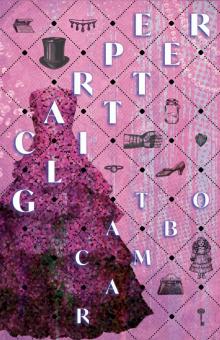 Carpe Glitter
Carpe Glitter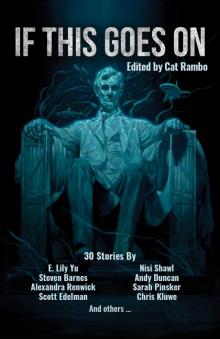 If This Goes On
If This Goes On Fantasy Scroll Magazine Issue #4
Fantasy Scroll Magazine Issue #4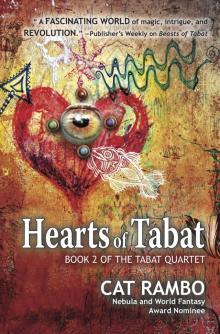 Hearts of Tabat
Hearts of Tabat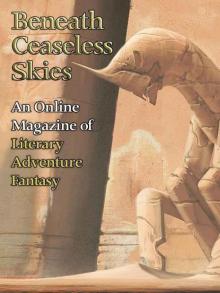 Beneath Ceaseless Skies #151
Beneath Ceaseless Skies #151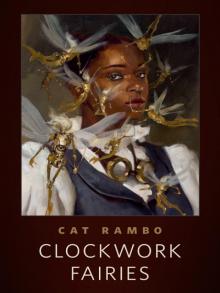 Clockwork Fairies
Clockwork Fairies Beneath Ceaseless Skies #170
Beneath Ceaseless Skies #170 Sugar
Sugar Near + Far
Near + Far Eyes Like Sky And Coal And Moonlight
Eyes Like Sky And Coal And Moonlight